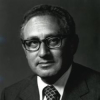Henry A. Kissinger

Henry A. Kissinger
Henry Alfred Kissingeris an American diplomat and political scientist. He served as National Security Advisor and later concurrently as United States Secretary of State in the administrations of presidents Richard Nixon and Gerald Ford. For his actions negotiating the ceasefire in Vietnam, Kissinger received the 1973 Nobel Peace Prize under controversial circumstances, with two members of the committee resigning in protest. Kissinger later sought, unsuccessfully, to return the prize. After his term, his advice has been sought by world leaders...
NationalityGerman
ProfessionStatesman
Date of Birth27 May 1923
CountryGermany
Every time there has been an attempt to disturb it, it led to two things. It led to immediate intense conflict with China, and it led to a reaffirmation in the end, because nobody wanted a major confrontation with China to this principle of a "one China" policy within which Taiwan is finding a place now. Its own position has greatly improved since the Nixon policy. It is richer, it is stronger and it is participating in many international organizations.
History knows no resting places and no plateaus
People think responsibility is hard to bear. It's not. I think that sometimes it is the absence of responsibility that is harder to bear. You have a great feeling of impotence.
In the short term, it would not have made it possible to resume relations, because in the Chinese mind, the humiliation of China started with the annexation of Taiwan by Japan. If the United States had suddenly declared Taiwan as a separate state - for which we would have had no support among other nations - the consequences would have been giving up our relationship with China and committing ourselves to a long-term conflict with China.
We must learn to distinguish morality from moralizing.
The greatest need of the contemporary international system is an agreed concept of order.
The key decision for a statesman is whether to commit his nation or not. There is no middle course. Once a great nation commits itself, it must prevail. It will acquire no kudos for translating its inner doubts into hesitation.
What China would do, I cannot predict. China has all but given up the claim to the use of force, except in the circumstance of Taiwan declaring its independence. That is a huge step forward over what the situation was many years ago.
We have three things in common: Irish wives, the ability to speak for 17 minutes without a verb, and the fact that we both speak with an accent.
One thing I don't want around me is a military intellectual. I don't have to worry about you on that score.
The capacity to admire others is not my most fully developed trait.
U.S. policy toward the third world should be one of depopulation
China has had a long and complex history and has managed to evolve its own culture for 4,000 years. It therefore not necessarily true that we know exactly what is best for the internal structure of China.
University politics make me long for the simplicity of the Middle East.